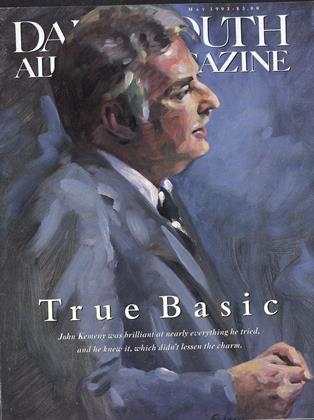THE QUESTION sounded simple enough. Would the Dartmouth faculty approve a unique graduate program for the College's comparative-literature majors, a fifth year of study leading to a master's degree? Academic questions have a way of turning complex, however, and this was no exception. The program proposal, several years in the making, eventually gained a yea vote at the February meeting of the Faculty of Arts and Sciences. But the addition of another program and a graduate one at that raised some hackles, coming as it did on the heels of recent faculty decisions to thoroughly restructure Dartmouth's curriculum and graduation requirements. Pending funding, of course.
Proponents of the comp-lit program stressed that the M.A. year would help Dartmouth students gain admission to the nation's top doctoral programs in comparative literature. According to German Professor Susanne Zantop, comp-lit graduate students must be fluent in three languages, which puts many foreign students at a distinct advantage over most Americans. The fifthyear M.A. studies, Zantop and colleagues argued, would enable Dartmouth students to pick up a third language, as well as deepen their critical skills.
Although the proposed comp-lit program wouldn't be big only five students a year many faculty members saw the red flag of larger issues. "What are our priorities regarding graduate studies?" asked Economics Professor Jack Menge, insisting that it was time to rank program requests undergraduate as well as graduate rather than indiscriminately place them in a queue until funding becomes available.
By meeting's end, comp lit's M.A. had joined the queue. But the real discussions are only just beginning. In a post-vote statement, President Freedman told the faculty that they will indeed need to define their curricular priorities. Otherwise, the president warned, their requests will lose credibility with the Trustees. Stay tuned.
 View Full Issue
View Full Issue
More From This Issue
-
 Feature
FeatureAcross the River, Rising
May 1993 By Ed Gray '67, T '71 -
 Cover Story
Cover StoryTrue Basic
May 1993 By Nardi Reeder Campion -
 Feature
FeatureThe Man Who Took Over Dartmouth
May 1993 By John Scotford Jr. '38 -
 Article
ArticleWomen in Love
May 1993 By Katharine Gingrass-Conley -
 Article
ArticleA Postponed Power
May 1993 By James O. Freedman -
 Article
ArticleDr. Wheelock's Journal
May 1993 By E. Wheelock
Karen Endicott
-
 Article
ArticleThe Anthropology of Freshman Trips
NOVEMBER 1989 By Karen Endicott -
 Article
ArticleFilling The Power Vacuum
June 1994 By Karen Endicott -
 Article
ArticleSay What?
November 1994 By Karen Endicott -
 Article
ArticleDid Science Kill Mother Nature?
November 1994 By Karen Endicott -
 Classroom
ClassroomThe Art and Science of Group Dynamics
Nov/Dec 2002 By Karen Endicott -
 Article
ArticleJapan's Ambivalent Story
OCTOBER 1988 By Mary Scott, Karen Endicott








